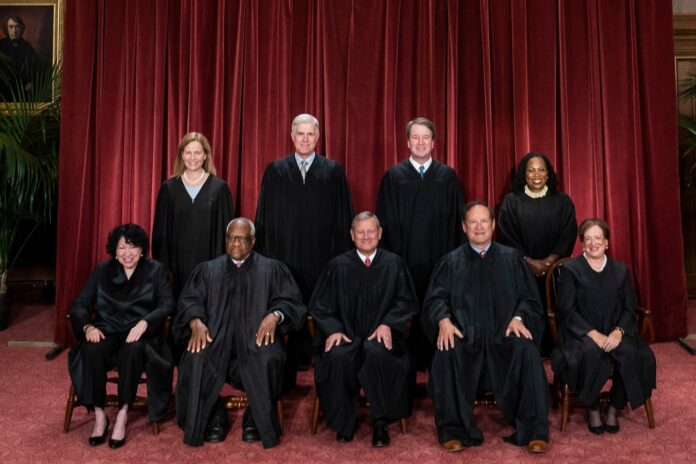Tech industry groups, whose members include Facebook and Google’s YouTube, asked the court to block Texas and Florida laws passed in 2021 that regulate companies’ content-moderation policies. The companies say the measures are unconstitutional and conflict with the First Amendment by stripping private companies of the right to choose what to publish on their platforms.
The court’s review of those laws will be the highest-profile examination to date of allegations that Silicon Valley companies are illegally censoring conservative viewpoints. Those accusations reached a fever pitch when Facebook, Twitter and other companies suspended President Donald Trump’s accounts in the wake of the Jan. 6, 2021, attack on the U.S. Capitol.
The justices’ ruling could have significant implications for the future of democracy and elections, as Americans increasingly rely on social media to read and discuss political news. It could also have wide-ranging effects for policymakers in Congress and statehouses around the country as they attempt to craft new laws governing social media and misinformation.
As Congress has remained deadlocked on those issues, states are playing a larger role in governing digital privacy, artificial intelligence and social media. Democrats largely have argued that the companies are not doing enough to root out hate speech and other harmful content online, and they have passed laws in California and New York to force greater transparency of the companies’ rules and decisions.
Appeals court judges, all nominated by Republican presidents, have issued conflicting rulings on state authority to restrict a business’s ability to select, edit and arrange content that appears on its social media platform.
The Biden administration urged the Supreme Court to take the social media case and to prevent the Texas and Florida laws from taking effect.
“The act of culling and curating the content that users see is inherently expressive, even if the speech that is collected is almost wholly provided by users,” Solicitor General Elizabeth B. Prelogar told the justices.
“And especially because the covered platforms’ only products are displays of expressive content, a government requirement that they display different content — for example, by including content they wish to exclude or organizing content in a different way — plainly implicates the First Amendment.”
The First Amendment generally protects against government infringement on speech. Courts have also held that private companies, including newspapers and broadcasters, have the right to control the speech they publish and disseminate. That includes the right of editors not to publish something they don’t want to publish.
The Texas law, signed by Gov. Greg Abbott (R), allows state residents and the attorney general to sue large social media companies if they believe they were unfairly banned or censored from a platform. A similar Florida law would penalize social media companies for blocking a politician’s posts.
Last spring, in a 5-4 vote, the Supreme Court prevented the Texas law from taking effect while the litigation continues.
“Social media platforms have transformed the way people communicate with each other and obtain news,” Justice Samuel A. Alito Jr. wrote in a dissent, joined by fellow conservatives, Justices Clarence Thomas and Neil M. Gorsuch. “At issue is a ground-breaking Texas law that addresses the power of dominant social media corporations to shape public discussion of the important issues of the day.”
Alito added: “It is not at all obvious how our existing precedents, which predate the age of the internet, should apply to large social media companies.”
Liberal justice Elena Kagan also dissented, but did not provide an explanation.
Tech trade groups Netchoice and the Computer & Communications Industry Association (CCIA) argue that if the laws take effect, they could have made it legally risky for tech companies to remove violent, hateful or indecent content. But leaving the content online could lead to user and advertiser boycotts of the services, the companies say.
The CCIA, which represents Meta, X and Google, called the order “encouraging” in a statement. “It is high time that the Supreme Court resolves whether governments can force websites to publish dangerous content,” said CCIA president Matt Schruers. “Telling private websites they must give equal treatment to extremist hate isn’t just unwise, it is unconstitutional, and we look forward to demonstrating that to the Court.”
In its order Friday, the justices agreed to hear 10 other cases, including a challenge to the FBI’s “no-fly” list that the government maintains to prevent terrorism suspects from boarding airplanes. The Biden administration asked the court to reverse a ruling from the U.S. Court of Appeals for the 9th Circuit that said an Oregon man’s challenge to his placement on the list could proceed even though the government had removed him seven years ago and had submitted a sworn declaration stating that he “will not be placed on the No Fly List in the future based on the currently available information.”



